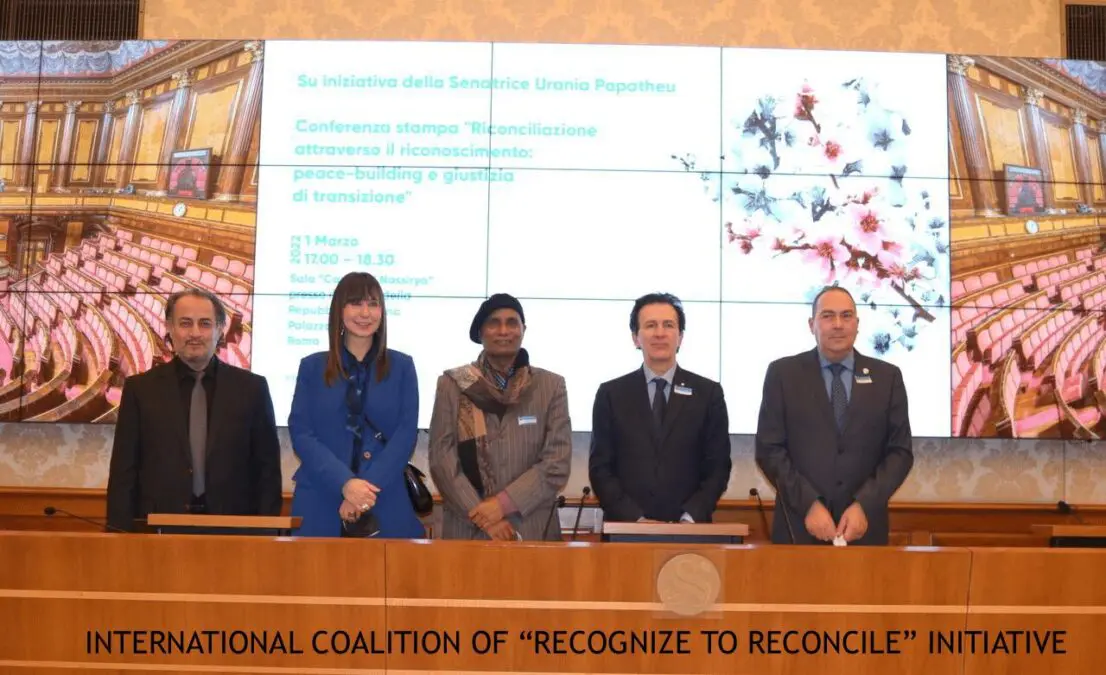Bashy Quraishy: Secretary General – EMISCO -European Muslim Initiative for Social Cohesion
Thierry Valle: Director – CAP LC – Coordination des Associations et des Particuliers pour la Liberté de Conscience.
The eternal city of Rome has seen ups and downs throughout its long history, but on the modern European political scene, it was the Treaty of Rome that laid the framework and established the European Economic Community on 25 March 1957, which later became the European Union.
In the same wonderful city, our partner the Italian Federation for Human Rights arranged an important NGO meeting on 1st March 2022 to discuss ways to avoid conflicts and build peace through mutual recognition, justice, and dialogue.
The background was to mark the 30th Anniversary of massacres of innocent civilians in Khojaly town in Nagorno-Karabakh – Azerbaijan during the first Karabakh war in 1992.
We all know that the struggle for human rights for all, is universal but only beneficial and can bring tangible results when it is continuous and done in cooperation with all progressive people. Unfortunately, in this age of fast information, struggle for human rights, crimes against humanity and issue of oppression of minorities are often put on the back burner.
That is why, some European Organizations took the step of forming a coalition to increase international support for the “Khojaly: Recognize to Reconcile” initiative of the Budapest International Center for the Prevention of Genocide and Mass Atrocities. As a result of the discussions, EMISCO- European Initiative for Social Cohesion, the Italian Federation for Human Rights, the Coordination of Associations and Individuals for Freedom of Conscience (France), the Deputy Director of the Central Museum of Srebrenica, and the former Personal Representative of the OSCE on Religion and Geopolitics announced the formation of the coalition.
Besides, Italian Senator Madam Urania Papatheu and MP Rossana Boldi, a member of the Italian Chamber of Deputies, other prominent speakers at the conference included: Professor Bulent Senay, former Personal Representative of the OSCE – Organisation for Security and Cooperation in Europe – on Religion and Geopolitics, Bashy Quraishy, Secretary General – European Muslim Initiative for Social Cohesion – EMISCO, Professor Antonio Stango, Chair of the Italian Federation for Human Rights, and Thierry Valle, Director CAP LC.
The conference debated the international legal assessment of the Khojaly genocide and backed the “Recognize to Reconcile” initiative, which calls on the Armenian government to acknowledge and apologize for the genocide.
Senator Urania Papatheu stated during the event that atrocities committed in Khojaly should be recognized as genocide and crime in Italy.
Italian legislators, delegates of international human rights organizations, European anti-racism and anti-genocide organizations, and other civil society representatives attended the conference.
It was also stated that the coalition will primarily be open to human rights organizations and prominent public and political figures for membership. The signed document emphasized that Armenia’s recognition of the Khojaly genocide will lead to the restoration of peace in the region.
Mass killings and exterminations of innocent human beings have been going on since the dawn of humanity. Extreme violence and oppression against minorities, encouraged by the States is still happening all over the world. Killings of Kashmiri Muslims in India, plundering of non-Arab population in Darfur in Sudan and more recently ongoing persecutions and killings of the Muslim Rohingya people by the state of Myanmar is well known. But the UN, EU and international organizations are looking the other way when it comes to do something practical to redress the situation.
By raising awareness about these acts of mass killings, and discussing their causes and consequences, we can expose the failings of international action and mobilize civil society towards the realization that a crime without justice is essentially a denial of the crime itself and an affront to the victims.
It must be mentioned that Khojaly refugees wrote to the UN, European Union, OSCE for years without any outcome and these international organizations remain indifferent to the disaster, that fell on Khojaly. There is no international legal mechanism for investigation and justice in the case of the conflict in Nagorno-Karabakh. As a result, the victims of the violence in Khojaly and their families/communities have suffered from a terrible injustice.
Taking into account that the leaders of both Azerbaijan and Armenia have declared their desire to “open a new page” and begin a “new peaceful era” in the region, the use of strong international mediation would help people to understand Khojaly realities through recognition, dialogue, and reconciliation. The “Recognize to Reconcile” initiative, which was launched at a conference held at the OSCE headquarters in Vienna on February 23rd, 2022 is the first step.
In light of the unprecedented challenges that Europe and the world face, such initiatives are especially important for reducing the risk of escalation in conflict situations around the world, particularly in areas where there are opportunities for peaceful transformation.
Humanity should be opposed to and concerned with injustices committed against an individual, a group or a nation. We should not make a distinction between the victims or believe in taking sides to justify violations by any nation against the other.
We should never hesitate in condemning in the strongest terms; crimes against humanity, genocide and massacres perpetrated on the name of religion, culture, ethnicity, or nationalism in any part of the world.
Thus, the message must be that there should be no hierarchy, no selected memory, no extra focus on one event or a particular massacre. To all peace-loving people, the loss of one human life is like killing the whole humanity.







